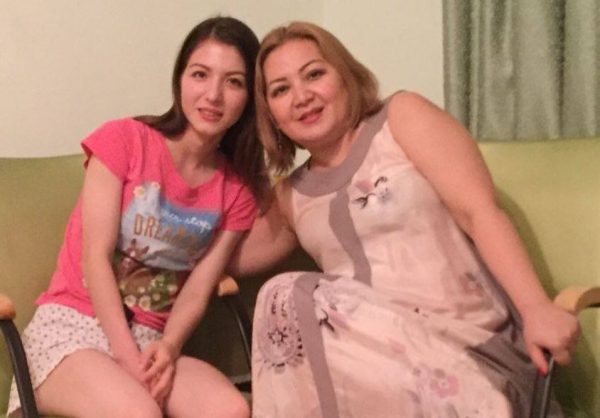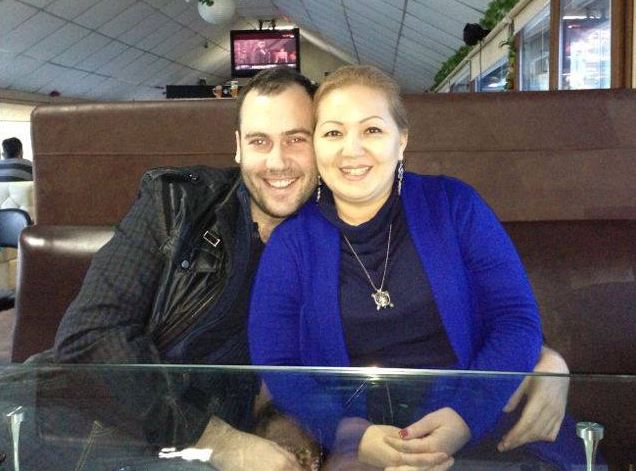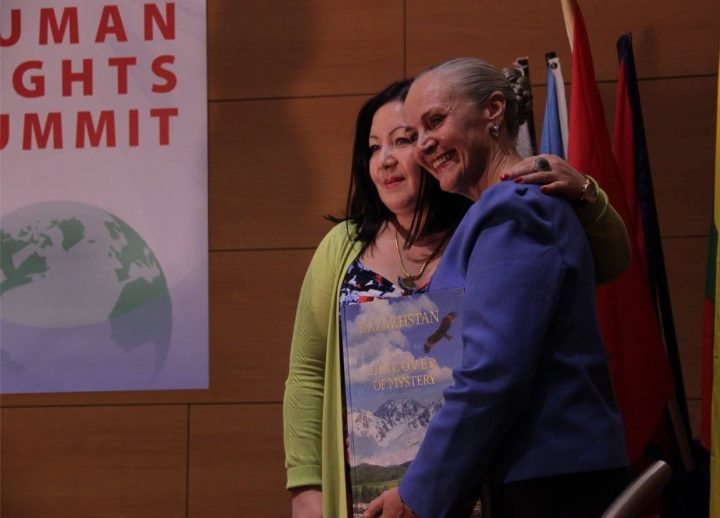Rigina is back. But is she there to stay?
Rigina Hikmatulina’s involvement in Scientology became an international incident when her mother, Dina Tylevich, 44, took to social and mass media and proclaimed that the church had lured her 20-year-old daughter from Kazakhstan and was holding her prisoner at its Florida “Flag Land Base.” With the use of the hashtag #ВернитеРигину (BringRiginaBack) and other methods, Dina got plenty of attention in the Russian-language press. Even we took note, writing a story about it on June 20.
And now, Rigina has been brought back, and is staying with her mother in Almaty, Kazakhstan, arriving there just six days ago. But how did that happen? And is Rigina abandoning Scientology?
The answers really surprised us after we had lengthy conversations with Dina’s husband Danil and also heard from Dina herself.
Rigina may be home, but the battle for her soul is only beginning. Scientology, which has relied heavily on the cheap labor it gets in Russian-speaking countries, is getting a pounding over this story, and after talking to Danil, we’re pretty sure it’s only going to get rougher.
Danil Tylevich, who is 34, describes a background of dabbling in Scientology but never committing to it seriously, the way his mother had. She was quite active, he says, and had worked her way up the organization’s “Bridge” of courses.
For his part, Danil ran into L. Ron Hubbard’s book Dianetics on his own and brought it home. He was going through a bit of a personal crisis at the time, and his mother seemed to have had some health benefits from her Scientology involvement. So Danil began his own Scientology adventure about ten years ago, taking a few courses and experiencing the “Purification Rundown,” a sauna-and-vitamins regimen that is supposed to cleanse the body and the mind.
“I was never really an active Scientologist,” Danil says. “But I did like the ‘admin tech,’ and I began studying it.”
Hubbard not only claimed to have special knowledge about the true nature of the solar system and mankind’s long and violent history in the universe, but he also wrote volume after volume about the proper way to run a business. One of the ways Scientology tries to extend its reach is by spreading Hubbard’s “administrative technology” or “admin tech” to unsuspecting businesses through front groups under an umbrella organization, the World Institute of Scientology Enterprises, or WISE.
After training in admin tech, Danil worked for a WISE company, spending several years traveling in Russia as the company offered its consulting services to local businesses. But then he came back to Almaty and opened his own business about four years ago, selling water in five-gallon containers.
If that sounds simple, it wasn’t. Selling water in Almaty meant traversing a minefield of local legal and environmental regulations, and Danil knew he couldn’t handle it without help. He got a recommendation, and made an appointment with a woman who specialized in helping businesses negotiate that legal puzzle.
Her name was Dina Sherenova. When Danil met Dina, he was 30, and she was ten years his senior. But they clicked, got married, and Danil became stepfather to Dina’s 15-year-old daughter by a previous marriage, Rigina Hikmatulina.
“I hoped it would help her,” Danil says.
He sent her to the local Scientology mission in Almaty to learn study tech, and she liked it well enough that she and her mother both began taking other courses there.
But soon after Dina and Rigina began their involvement in Scientology, there was trouble. The Almaty mission was raided in 2012 by law enforcement, and its records were confiscated, including the private files for about 8,000 current and past members.
Danil says that Dina has a cousin who works in a hospital run by the National Security Committee of the Republic of Kazakhstan, which Danil describes as Kazakhstan’s version of the KGB. And after the raid, which occurred just after Dina and Rigina had begun their involvement in Scientology, they were suddenly looked on with suspicion by the organization.
“The mission had to move after the raid, and for a year we weren’t told where it was. Then, over time, we started to get visits at home from the staff,” Danil says.
Eventually, the concerns about Dina’s connections in government dissipated, and they were let in on where the new mission had relocated — in a dank basement of a building that had no outward sign that a Scientology mission was present.
Rigina, meanwhile, was finishing high school with good marks, and was being encouraged to consider college. She had a strong interest in genetics and biology, and eventually wanted to become a physician.
But the recruiters at the mission, Danil says, had other plans for her.
“They told us that the local mission was not fit for us. We should be at Flag, they said. They would visit us and take Dina and Rigina out to nice restaurants, showing them photos of the Flag Land Base in Florida. Dina liked it right away,” he says.
Rigina was told that with her interest in genetics, she should study to be a Scientology auditor. “They claimed it was related,” Danil says.
Also, at the time, Danil and Dina were trying to get pregnant, and they were told that the Super Power courses they could take at the Flag Building in Clearwater would help them have a healthy child.
“If Dina could become Clear and do Super Power, she could then choose the exact thetan we would like for our baby, because she would have such abilities,” he says they were told. In other words, with her newly purchased superhuman Scientology abilities, Dina would be able to select the immortal being, called a “thetan” that would inhabit her new child.
Excited by the possibilities for what they might achieve in Florida, Dina and Rigina began preparing in earnest. Rigina plunged into an intense study of “the Basics,” a rigorous background of Scientology’s early texts. “She spent the full day hatting on Basics. She was the fastest-moving student in the mission,” Danil says.
Rigina also signed a commitment to the Sea Organization, Scientology’s inner hardcore, promising to work for Scientology for a billion years.
“We were told it was just a joke,” Danil says, and they had no idea how seriously the organization actually considers signing such a commitment.
The family was convinced to turn over about $100,000 US in order to pay ahead for all of the things they wanted to achieve — Rigina’s auditor training, and Dina’s path to going Clear and attaining Super Power. In order to pay for it, Danil sold his water business and a three-bedroom apartment.
How, we asked, were they convinced to do such a thing?
“We were trying to get pregnant. And Rigina’s education was very important to us. And they hit us with the usual Scientology argument: ‘What’s an apartment? A pile of bricks. You’ll get rid of it now, but you’ll get it back tenfold.’ Also, they told us paying up front saved a lot of money over paying for it piece by piece.”
By late 2013, Dina and Rigina were ready to fly to Flag to get the services they had paid for. But they ran into a problem.
Dina was told that she couldn’t go to Flag until she had gone through a security clearance, and she needed to get a “security check,” right away.
“Sec checks” are interrogations, done on a Scientology e-meter, and they are intrusive and can be brutal. And Dina was told she could only get hers in St. Petersburg, Russia – a five-hour flight away.
So Dina flew to St. Petersburg in the fall of 2013 to get her sec check while Rigina stayed back in Almaty, continuing to work on her Scientology “Basics.”
“She got there, and they told her at the St. Petersburg org that there was no one who could give her the sec check. They told her to wait,” he says.
So she waited. After waiting two months, she finally found someone who could do the interrogation. But then Dina was told that it would be a full series of sec checks.
The sec checks alone took a month, and they were charged $16,000 US for them.
One of the sec checks was about drug use, Danil says. “Dina had been a rhythmic gymnast. She didn’t use drugs. It was such a waste of time.”
When she returned to Almaty after the months wasted in St. Petersburg, Dina confronted Lybov Petrenko, a top Scientology Office of Special Affairs executive in Kazakhstan.
“Dina called her an idiot. She said none of that was necessary. They didn’t need to send her to St. Petersburg to prove to them that Dina wasn’t on drugs,” he says.
Now, on January 11, 2014, Dina was written up for talking in such a way to a top OSA operative. “She received a ‘non-enturbulation order’ for it. We got a phone call from the MAA [master-at-arms] at Flag. Now she was told she couldn’t go to Florida until she sorted out the non-enturbulation order.”
Rigina, meanwhile, kept working on her courses, and in May 2014 she finished her work on the Basics. She was cleared to go to Flag. But then another issue came up.
They had wanted to go on tourist visas. But since the Boston marathon bombing the previous year, it had become difficult for young Kazakhs to obtain them. The Tsarnaev brothers were Chechens who had lived in Kyrgyzstan, but they had friends from Kazakhstan who had tried to destroy evidence after the bombing.
The family was convinced to apply for an R-1 Religious Visa for Rigina. (As we’ve written in the past, Scientology relies heavily on such visas to bring in workers from overseas to its Florida facility.) Rigina’s R-1 visa would be valid for a year.
On June 26, 2014, Rigina flew to Tampa to begin her work at the Flag Land Base in Clearwater. Dina, with her non-enturbulation order, was stuck in Kazakhstan. Danil says they tried to make the best of it.
“Dina was regularly calling Florida to talk to Rigina, who said she was working. And, at that point, Dina thought it was still a good thing,” Danil says.
But as the time passed, Dina was becoming more exasperated. She wanted to be with her daughter, but she was at the mercy of the organization in Kazakhstan. Meanwhile, they were running out of money.
“Rigina was calling her once a week after she first got there. But then it became once a month. And she was asking for money. And then we heard from her less and less.”
Although Rigina was working for the Sea Org day and night, she said she needed pocket money, which sounded strange.
She told them that after she had arrived, she had stayed in a hotel for a few days, but then had been transferred to an apartment she shared with other women. She told them that she had blazed through her EPF in only eight days: The Estates Project Force is the Sea Org’s boot camp, and it can take a month or longer.
“She sounded thrilled. Dina was very proud at that point,” Danil says.
Despite Dina’s frustrations with being stuck in Kazakhstan, she was being told that her daughter was a budding star at Flag, and that she seemed to have the potential to join the Commodore’s Messenger Organization.
The CMO was the elite among the elite. It had started as a group of mostly young girls who had served L. Ron Hubbard aboard the yacht Apollo in the early 1970s, carrying his messages to other crew on the ship.
Now, forty years later, it sounded as if the attractive and talented young Kazakh phenom was being groomed to become one of David Miscavige’s inner circle at the International Base, in California.
But first, Rigina had to keep up with her work at Flag. Danil says as much as she was dazzled by the thought of making the CMO, Rigina already had doubts that she had the right stuff for it.
Meanwhile, back in Kazakhstan, Dina was still being told she needed to make amends for her “non-enturbulation order” before she could have any hope of joining her daughter in Florida. So that’s how she became involved in one of Scientology’s stealthy front groups, Youth for Human Rights International, a non-profit founded by South African Scientologist Mary Shuttleworth in 2001. Scientology leader David Miscavige makes it quite clear during the church’s international events that YHRI is a project of Scientology itself as it promotes understanding of the rights listed in a 1948 United Nations document, the Universal Declaration of Human Rights. That seemingly benign mission is actually a way to reach young people and get Scientology literature into their hands.
“We were told it was an easy program to run,” Danil says, explaining that Dina got involved solely because she wanted to make “amends” for her “ethics” problem. Dina became Kazakhstan’s representative for YHRI and began attending international conferences. Danil says she was soon being told that her activity with YHRI could eventually make her Kazakhstan’s first “Freedom Medal” winner, a high honor in Scientology.
Danil says they were doing whatever they could so Dina could go to Flag. They were convinced, for example, to repurpose some of the money they had already put on account at the suggestion of Scientology’s version of a traveling husband and wife sales team from the Flag Land Base. The Flag couple convinced them to use $38,000 of what they already had on account and put it toward the purchase of two new e-meters and a donation to the International Association of Scientologists. (The IAS is Scientology’s defense fund, and all church members are pressured heavily to donate large sums to it in order to increase their “status.”) Danil points out that it was the Flag couple who then got “stats” for those expenditures (and a 10 percent commission).
Danil says they knew they were being extorted, but they were desperate to do what it took to reunite mother and daughter.
Several times, they bought plane tickets for Rigina to come back to Kazakhstan, at least for a visit. But Rigina could never use them. “Her passport was being held by Scientology. Every time when a flight we’d paid for came up, she would be told that she couldn’t leave because there was no one to replace her in her job,” Danil says.
And back home, there were conflicts between Dina and her fellow Scientologists in Kazakhstan. “There are other mission members who don’t like Dina,” Danil says. “Dina was denied services again because someone made a complaint. Her Bridge process was stopped.”
As the end of 2014 approached, Dina now found out that she was in danger of being declared a Suppressive Person. In Scientology, there’s almost nothing worse than being declared an SP. It not only means excommunication, it also means “disconnection” — every Scientologist who wants to remain in good standing with the church must cut off all contact with an SP or risk being declared SP themselves. If Dina were declared SP, she might never see Rigina again.
“Dina was told to take a very lengthy program. They wanted her to do an ethical program that would last more than two months. But we had no more money at that point,” Danil says. “She was then declared ‘PTS Type B’.”
In other words, the Church of Scientology had now labeled Dina a criminal.
Danil says they began writing letters to the Flag Land Base, trying to explain the situation and explaining that complaints made against Dina were all based on lies.
“A person at the office of the International Justice Chief in Denmark told me that if we paid $15,000, it would make the problem go away. And Flag said they wanted $25,000 to cancel the non-enturbulation order and to restore us with the IAS,” Danil says.
But they didn’t want to pay anything more. Danil says that it had become obvious: They were simply being extorted, and it had the effect of keeping mother and daughter separated so Scientology could do what it wanted with Rigina.
In the fall of 2015, Dina and Danil contacted law enforcement.
It turned out that Kazakhstan authorities were very interested in what they had to say. Since the mission had been raided in 2012, Scientology had increasingly been looked upon as a criminal enterprise by the government.
“The police were happy to hear from us. They were looking for someone who would testify against the Almaty mission. They were quite welcoming,” Danil says.
And now, they had little to lose: At the end of 2015, Rigina called from Flag and informed them that she was disconnecting from them. She urged them to reach a cash settlement with the church and drop their complaints to law enforcement.
“She was being used as a part of the blackmailing operation against us,” Danil says. “She sent a notarized letter saying she was at Flag of her own free will, that her parents had sent her there, that no one was holding her there and that this piece of paper could be used in court.”
Once they received that letter, Danil says, they knew there was no turning back. They began to make plans that once law enforcement had made its move, they were going to the media.
As 2016 began, raids were being planned in multiple cities around the country. The raid that took place in Almaty, they say, was a direct result of their complaint. Their private folders were found and seized during that raid, Danil says.
After waiting several more months, then they began their media campaign. Dina went all out. Not only did she give interviews to Kazakh and Russian media outlets, she also took her campaign to Twitter and Facebook, where she started a group named “Kazakhstan without totalitarian cults.” They also appealed to the US ambassador in Kazakhstan, George E. Krol (his office told them that the ambassador doesn’t get involved in individual cases).
The story even began to show up in the US, and on June 20, we wrote a story based on translations of the Russian-language media, and admitted some awe for Dina’s “media-grabbing” abilities.
Danil and Dina tell us that our story may have been the one that spooked Scientology into taking action.
“Scientology wasn’t afraid of reactions to our situation in Kazakhstan. They were afraid of US reactions. Your article made all the difference,” Danil says.
A plan was then apparently put into action. A few days after our story appeared, Rigina suddenly sent a note to her mother saying that everything was fine. But in fact, everything was not fine.
As we had pointed out in our story, since Rigina had gone to the US in June 2014 on a one-year R-1 visa — a visa which could only be renewed in Kazakhstan — then by June 2016 she was in the US illegally. “Scientology must have believed that the visa situation made them vulnerable,” Danil says. He believes that Scientology became afraid the Kazakhstan embassy in the US might start making inquiries at the Flag Land Base.
On June 27, Scientology sent Rigina on a journey that it had hoped to keep secret from Dina and Danil. Rigina flew from Tampa to New York, then to Moscow, and then on to Astana, Kazakhstan’s capital. The plan was for Rigina to spend as few days in Astana as possible, get her visa renewed, and then fly back to Florida on July 1 without Dina and Danil knowing that she’d even been in the country.
When Rigina landed in Astana, she went to stay with her biological father, Rais Hikmatulin, who, Danil says, has no contact with Dina these days and had spent little time with Rigina as she was growing up.
And the plan might have worked, except that Kazakhstan’s authorities, because of the investigations of Scientology that were already underway, wasn’t asleep at the switch.
When Rigina arrived at passport control, she was flagged. She was allowed to enter, but law enforcement was notified that she’d entered the country.
In turn, they notified Dina only an hour after Rigina arrived at the airport in Astana.
Dina soon knew not only that her daughter was in Kazakhstan, but that she was headed to Rais Hikmatulin’s house. She then called her mother, Tamara, who still maintained some contact with Rais. From her mom, Dina got the phone number for the Astana home.
“Rigina was pretty surprised when we called and told her we knew she was in Kazakhstan,” Danil says.
They were soon on a flight to Astana, which only takes a couple of hours.
“We saw her for half a day. We tried to convince her that we were not SPs,” Danil says. “We got her to warm up to us a little.”
Her defenses lowered, Rigina agreed to return to Almaty with them on June 30.
“She’s staying with us now. She’s a little hostile, but she’s coming around,” he says. “It’s difficult for her to accept new information. She’s struggling with the new data.”
Well, sure. Like the information that her mother had gone on the national media and called Scientology a totalitarian cult that had kidnapped and brainwashed her daughter — that new data?
“Rigina is not aware of what Dina has said about Scientology in the media,” Danil admitted.
He and Dina say they are pretending to be good Scientologists for Rigina’s benefit, and are telling her that they simply object to Scientology’s rules and the way they’ve been treated.
“We’re going about things gradually,” he says.
We asked Dina how her daughter was adapting.
“My child came back very unsociable. She looks through different videos from ex-Scientologists and says their complaints are things made up by SPs. She avoids seeing her granny, who she loved very much before going to Flag. Yesterday, when we were walking on the street, she saw her former high school classmates and decided to avoid them, preferring not to see them,” she told us.
While Dina and Danil try to reintroduce their daughter to Almaty in a gentle way, outside of that environment they’ve created for her Kazakhstan’s media is clamoring for a look inside.
“We’re denying the media requests to talk to Rigina. But the KTK channel is preparing to make a documentary about Scientology in Russia and Kazakhstan. It should start filming this week,” Danil says, and he describes KTK as Kazakhstan’s HBO. “They want a Russian-language equivalent to Going Clear.”
In the meantime, Dina and Danil are trying to learn more from Rigina about what she went through. For all of its talk about giving her training that was better than a college education in biology, Scientology had made Rigina a deputy director at the Fort Harrison Hotel, the center of its Flag Land Base and where wealthy Scientologists come to stay while taking upper level courses and paying up to $1,000 an hour for counseling.
Rigina was supervising the cleaning crew, and, like all Sea Org workers, was being paid pennies an hour while her passport was under lock and key. We’ve asked Scientology spokeswoman Karin Pouw for a statement from the church about how working in the hotel was the kind of superior alternative to university that Rigina was promised. We’ll let you know if we hear from her.
“We came to the realization that there are two kinds of fools in Scientology. The one kind pays their money. The other kind pays in slave labor. In our family, Scientology found both,” Danil says.
He adds that they are planning to join an effort, suggested by former Scientologist Karen de la Carriere, that ex-Scientologists from the former Soviet republics write to their ambassadors in the US, asking that they shut down the issuing of R-1 visas so that cheap foreign labor can be exploited by Scientology.
In the meantime, Dina and Danil say they are gradually helping Rigina adapt to the idea of being back home.
“She looks good. She sleeps a lot. She wasn’t getting much sleep at Flag,” Danil says.
——————–
After the fireworks
Just a note from your proprietor about how much it meant to us to see all the great stories of independence posted by our readers in the comments yesterday. Thanks to Dan Koon and Simi Valley and Claire Swazey and Michael Tilse and Willie Jones and Eric Tenorio and so many others who took the time to tell us about their brave decision to choose a new life.
We are truly grateful.
——————–
 Posted by Tony Ortega on July 5, 2016 at 07:00
Posted by Tony Ortega on July 5, 2016 at 07:00
E-mail tips and story ideas to tonyo94 AT gmail DOT com or follow us on Twitter. We post behind-the-scenes updates at our Facebook author page. After every new story we send out an alert to our e-mail list and our FB page.
Our book, The Unbreakable Miss Lovely: How the Church of Scientology tried to destroy Paulette Cooper, is on sale at Amazon in paperback and Kindle editions. We’ve posted photographs of Paulette and scenes from her life at a separate location. Reader Sookie put together a complete index. More information about the book, and our 2015 book tour, can also be found at the book’s dedicated page.
Learn about Scientology with our numerous series with experts…
BLOGGING DIANETICS: We read Scientology’s founding text cover to cover with the help of L.A. attorney and former church member Vance Woodward
UP THE BRIDGE: Claire Headley and Bruce Hines train us as Scientologists
GETTING OUR ETHICS IN: Jefferson Hawkins explains Scientology’s system of justice
SCIENTOLOGY MYTHBUSTING: Historian Jon Atack discusses key Scientology concepts
Other links: Shelly Miscavige, ten years gone | The Lisa McPherson story told in real time | The Cathriona White stories | The Leah Remini ‘Knowledge Reports’ | Hear audio of a Scientology excommunication | Scientology’s little day care of horrors | Whatever happened to Steve Fishman? | Felony charges for Scientology’s drug rehab scam | Why Scientology digs bomb-proof vaults in the desert | PZ Myers reads L. Ron Hubbard’s “A History of Man” | Scientology’s Master Spies | Scientology’s Private Dancer | The mystery of the richest Scientologist and his wayward sons | Scientology’s shocking mistreatment of the mentally ill | Scientology boasts about assistance from Google | The Underground Bunker’s Official Theme Song | The Underground Bunker FAQ
Our Guide to Alex Gibney’s film ‘Going Clear,’ and our pages about its principal figures…
Jason Beghe | Tom DeVocht | Sara Goldberg | Paul Haggis | Mark “Marty” Rathbun | Mike Rinder | Spanky Taylor | Hana Whitfield











